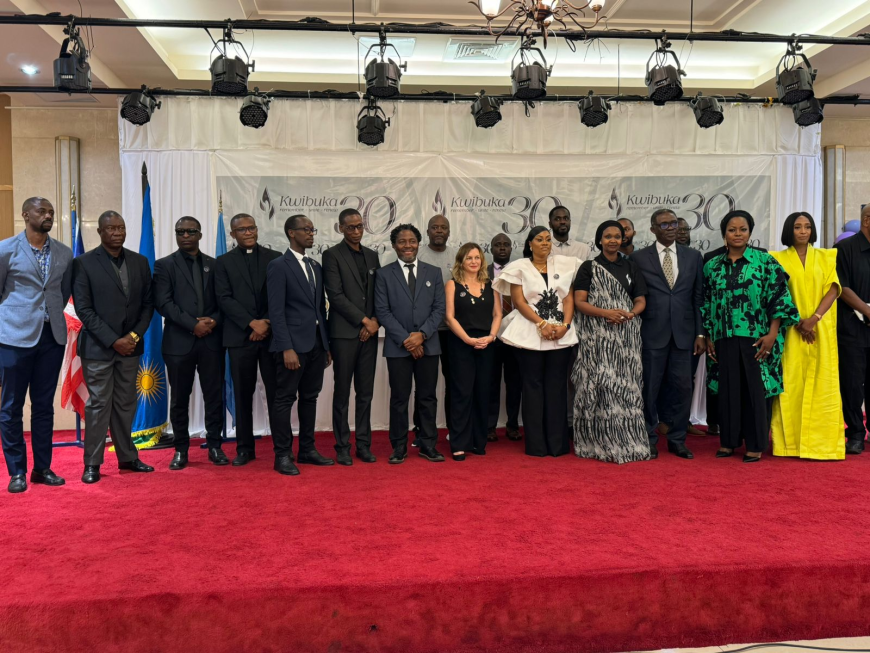Rwanda and Liberia Unite in Solemn Remembrance: 30th Anniversary of Tutsi Genocide Highlights Global Call for Unity against Hate

The High Commission of the Republic of Rwanda in Ghana, with jurisdiction in Liberia, in partnership with the United Nations (UN) in Liberia, commemorated the 30th anniversary of the 1994 Genocide against the Tutsi in Rwanda. The solemn event brought together high dignitaries from the government, international partners, and students, fostering a poignant atmosphere of remembrance and reflection.
The program featured a drama performance that poignantly depicted the harrowing events of the genocide and a heartfelt testimony from one of the survivors. These presentations underscored the profound impact of the tragedy and the enduring strength of those who lived through it.
In her remarks, UN Resident Coordinator Christine Umutoni highlighted the sheer brutality of the genocide and the indomitable spirit of the survivors. "On this day in 1994, and for nearly 100 days that followed, one million Tutsi children, women, and men were killed by their fellow Rwandans. Families turned against families, friends to foes, and a dark spirit of intentional and brutal violence engulfed a nation.
We will never forget the victims of this genocide, nor will we ever forget the bravery and resilience of those who survived, whose courage and willingness to forgive remain bursts of light and hope amidst human history," she stated.
Umutoni's speech also addressed the roots of the genocide, emphasizing the role of hate speech and ethnic tensions. "This year, we remind ourselves of genocide's rancid root: hate. We can draw a straight line between the senseless slaughter of one million Tutsi, as well as some Hutu and others who opposed the genocide, and decades of hate speech that preceded it, engulfed by ethnic tensions and the long shadow of colonialism," she explained.
The 1994 Genocide against the Tutsi was a horrific chapter in Rwanda's history, beginning on April 7, 1994, and lasting for approximately 100 days. During this period, an estimated one million Tutsi, along with moderate Hutu and others who opposed the genocide, were systematically slaughtered by extremists within the Rwandan government and military. The genocide was fueled by long-standing ethnic tensions exacerbated by years of divisive colonial policies and propaganda.
The immediate trigger came on April 6, 1994, when the plane carrying Rwandan President Juvénal Habyarimana was shot down. This event provided the pretext for Hutu extremists to launch a coordinated campaign of mass murder. Government officials, military leaders, and local militias orchestrated the killings, and ordinary citizens were often coerced into participating. The violence was widespread and devastating, turning Rwanda into a killing field.
In the aftermath of the genocide, Rwanda was left in ruins. The social fabric was torn apart, with families decimated and communities destroyed. Survivors faced immense challenges in rebuilding their lives amid the trauma and loss.
Reflecting on contemporary issues, Umutoni warned of the resurgence of similar dark impulses globally. "Today, around the world, the darkest impulses of humanity are being awakened once more by the voices of extremism, division, and hate. To those who seek to divide us, we must deliver a clear, unequivocal, and urgent message: Never again."
She concluded with a call to action: "On this solemn day of remembrance, let's pledge to stand as one against all forms of hatred and discrimination. Let's ensure that the acts that began on April 7, 1994, are never forgotten and never repeated anywhere."
Speaking on behalf of the government of Liberia Hon. Ibrahim Nyei Deputy minister for international cooperation of MFA Liberia reminded the gathering not to forget what happened in Rwanda and to protect those at risk of genocide. "The attempt to exterminate an entire ethnic community was beyond human imagination," he said.
He praised the resilience of Rwanda as a lesson of courage for everyone and reaffirmed Liberia's commitment to maintaining strong ties with Rwanda. Furthermore, he called on the United Nations to address ongoing conflicts around the world, including in Yemen, Syria, Ukraine, Sudan, Afghanistan, Ethiopia, and the Gaza Strip.
The commemoration served as a powerful reminder of the atrocities of the past and the continuous need for vigilance and unity in the face of hatred and intolerance.
What's Your Reaction?






































































